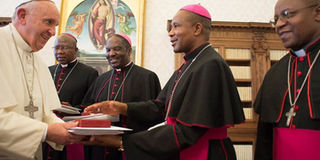Why the Pope is important

Why the Pope is important
What you need to know:
Opinion. The Pope, bishops, priests and other ministries exist in order to serve the flock of God; not as domineering over it, or just for its efficient organisation, writes MSGR JOHN WYNAND KATENDE.
As the Catholic Church in Uganda celebrates the ordination of new priests, we dedicate this Sunday to the institution of the papacy, the highest office in the priesthood of Jesus Christ. The papacy is also said to be one of the most enduring institutions in the world and has had a prominent part in world history.
“You are Peter, and upon this rock I will build my church. I will give to you the keys of the kingdom of heaven.” (Matthew 16:18). The Catholic Church teaches that the office of shepherding the Church, that was held by the apostles, as a group or “college” with Saint Peter at their head, is now held by their successors, the bishops, with the bishop of Rome (the pope) at their head. The power of the keys gives the Pope a unique share in the authority of Jesus, the divine head of the Church. His role as father to God’s people (Papa) had been foretold in Isaiah 22:21-22 and affirmed in the book of Revelations 3:7.
Continuing Jesus role
The early Church believed Jesus wanted Peter to have successors, and they were in a better position to know Jesus’ will than we are. Moreover, there is no Biblical data to deny the continuation of Peter’s ministry as the head of the apostles. Without a Pope, the Church would not be what it is supposed to be, “the pillar and safeguard of truth” (1 Timothy 3:15).
In 380 Christianity was declared the state religion of the Roman Empire, with the name “Catholic Christians” reserved for those who accepted that faith under the papacy. In 1929, the Vatican was established as an independent city-state, guaranteeing papal independence from secular rule. In 1054 the Eastern Orthodox Church separated from the Roman Catholic Church, due to geographical, political and theological differences. Protestant Reformers criticised the papacy and priests as corrupt in 1517. With the English Reformation (1527-1590), King Henry VIII declared himself the head of the Church of England.
Authority from days of Peter
Peter means rock; implying that Jesus was that biblical wise man who built his house on rock so that it would endure the test of time (Matthew 7:25). Peter’s worshipful faith comes to him as gift from above, not from his own ability. God chooses whom He wills, irrespective of their merits.
Despite the apparent incompetence of Peter, the Church has withstood persecutions, internal dissents, scandals and divisions, through the centuries. The reason is that Jesus resides within his Church, especially in the person of the pope. Peter and the popes are not successors, but only vicars of Jesus. A vicar exercises authority in the name of the person to whom the authority actually belongs. So, in essence, Jesus is the Rock, guaranteeing that no matter what, the Church is firmly set on solid foundation. The Pope serves as a cradle of authority and continuity.
The Pope, bishops, priests and other ministries exist in order to serve the flock of God, not as domineering over it, or just for its efficient organisation (2 Peter 5:13). Since the time of Peter, the pope has kept the church united in a community of mutual love, and in faithful obedience to the Gospel (Acts 2:42ff; 4:32f).
The Pope’s role
Currently, in addition to the expansion of the Christian faith and doctrine, the popes are involved in ecumenism and interfaith dialogue, charitable work, and the defense of human rights. Christians ought to thank Jesus for the papacy. They should make known to him and his collaborators both their appreciation as well as their loyal criticisms.
Today we particularly remember and pray for Pope Francis that God may establish him in faith and wisdom to lead the Church on the way to the Kingdom.
NOTE
Peter means rock; implying that Jesus was that biblical wise man who built his house on rock so that it would endure the test of time (Matthew 7:25). Peter’s worshipful faith comes to him as gift from above, not from his own ability. God chooses whom He wills, irrespective of their merits.




